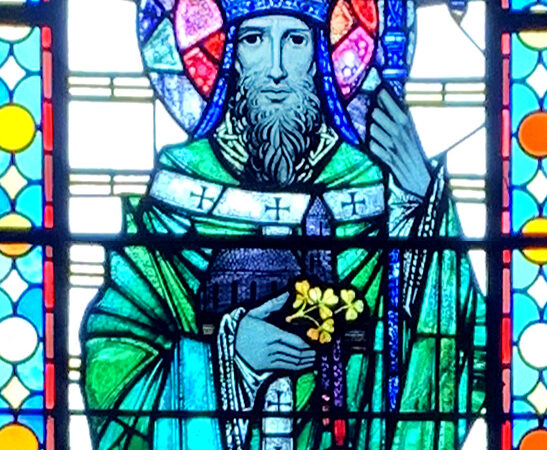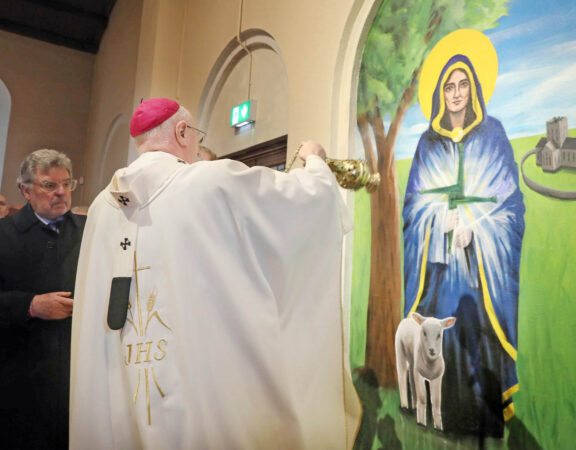DIACONATE ORDINATION OF FRANK TRIAS, C.P.
Homily Notes of Most Rev. Diarmuid Martin Archbishop of Dublin
Mount Argus, 13th December 2014
The Gospel reading that we have just heard appears in Saint John’s Gospel in a particular context. It is the reply of Jesus to what appears a very simple matter. Some Greeks had come to the Apostle Philip and they say “Sir, we would like to see Jesus”. Philip and Andrew then go to Jesus to tell him of the request and the reply is remarkable.
Jesus reply is not that this group of Greeks can come to greet him or is it an invitation to a discussion. Jesus enters, rather, into this deep theological reflection saying that “the hour had come for him to be glorified” and begins to speak of death.
To understand this we have to look at an even wider context. At the time in which this Gospel was written something had changed from the time of the encounter with the small group of Greeks. The hearers would understand that request of a small group of Jews as having been already fulfilled through what was taking place in the newly emerging Church, which was embracing men and women not just Jews and Greeks, but also other foreigners and a wide range of men and women who were sinners and culturally on the margins.
“Greeks” here, then, is really a code word for those who did not fit into the narrow worldview of those who consider themselves justified on their own terms. Looked at in that light this Gospel passage is a challenge to us today to examine our own consciences on what kind of Church we are: a Church of those who comfortably feel that we belong to a community of the saved – a sort of safe community – or one that is open and welcoming to those who are seeking and doubting and who today would like to see Jesus.
Jesus says that the hour has come for him to be lifted up. Many of the early direct hearers of Jesus would have thought of “being raised up” as the culmination of Jesus’ life through earthly glory or a raising up into an otherworldly realm, but in their own terms of what that would mean.
The first reader of Saint John’s Gospel would have witnessed a great growth in the Church and John takes up this this parable of Jesus to remind them that the growth of the Church is not the fruit of their success. The “rich harvest” is the fruit of the death of Jesus on the cross. For Jesus, “being raised” up means “being raised up on the cross”.
And this passage of death to life is not just the historical path which Jesus freely followed. It is the path which is set for all Christian believers. “Anyone who loves his life will lose it; anyone who hates his life in this world will keep it for eternal life”.
One of the particular themes which Pope Francis stresses often is that our understanding of our call to be Christians begins in places which we might not expect: it begins on the periphery. His speaking of the periphery is not simply an appeal for us to go out and help the less fortunate. He stresses that we can only really understand the Christian message if we first go out and identify ourselves with those who do not have what we have, whether it be because they are isolated and abandoned, because they are hungry or homeless, because their faith is confused and full of doubts. We learn more through identifying ourselves with them than we do from closing ourselves within our own certainties. That is a challenging message and one which makes many feel uneasy. It is easier to feel certain than to feel challenged.
Pope Francis’ message is that in the face of the physical and spiritual and religious challenges which people encounter with all their doubts and anxieties, the only way in which we can lead them to a deeper faith is through us identifying ourselves with the Jesus who wishes to lift their burdens and free them. But doing that involves inevitably a passage on our part from loving our own lives into a new life of self-giving. The Christian must be close to and understand the helplessness of being the least, and never identify himself or herself with any establishment or power group or personal comfort zone.
Frank: The deacon is called to witness to a particular and essential dimension of the Church, that of being servant. The characteristic of being a servant must become a dominant characteristic in your life. Whenever any ministry in the Church loses that characteristic of service, then it can so quickly degenerate into the opposite to ministry, to the temptation towards self-centeredness, towards using ministry and using others really to satisfy oneself, and thus to a betrayal of sacred authority which is exercised then not as ecclesial service, but in one’s own interest.
All of us who are called to exercise ministry in the Church are called to continually examine what are the underlying motivations which inspire our actions and our attitudes and to undergo a constant process of discernment, and purification and of conversion in our lives as regards the deepest motives which inspire our actions.
A little later in this ceremony of ordination, when I will consign the book of the Gospels to Frank, the liturgical text stresses how the minister must interiorise the Gospel, with these words: “Believe what you read, teach what you believe and practice what you teach”.
Witness means total identification with Jesus. Evangelization can only be done by those who are evangelized, who allow the name, message and love first to change themselves, who allow Jesus to take ownership of the lives.
“Believe what you read, teach what you believe and practice what you teach” is a mandate to live a life of integrity and coherence with the Gospel.
“Believe what you read” is not just an intellectual exercise. It is not something that is attested to by a diploma or an academic degree. It is attested to by the manner in which we accept the word and allow it to enter into our lives. The effectiveness of the Word comes not from our intellectual skills, but through the power of the Spirit. The Word which we receive is the Spirit of Truth. That Word is proclaimed and revealed to us through the gift of the Spirit. That Word can only be understood and interiorised by the action of the same spirit.
At Pentecost the Spirit descended on the Apostles and they were sent out to preach the Word of God in a way that it is understood by all who listen “in their own language”, that is, in the specific cultural and human context in which they live. It is the Spirit which enables the Word of God to be translated into the human language. The same spirit who throughout the history of salvation has spoken through the prophets will enable the Word of God to speak through you, Frank, in the language of our times, to those who seek in the cultural expressions of our world to see Jesus.
If the centrality in your life of this Jesus who reveals the God who is love is lost, then little by little the effectiveness of your actions will be lost, as your message will not be that which can quench the thirsts of humankind, but the limitedness and imperfection of your self. May the Lord accompany you, Frank, in your ministry of proclaiming the word and of service.






